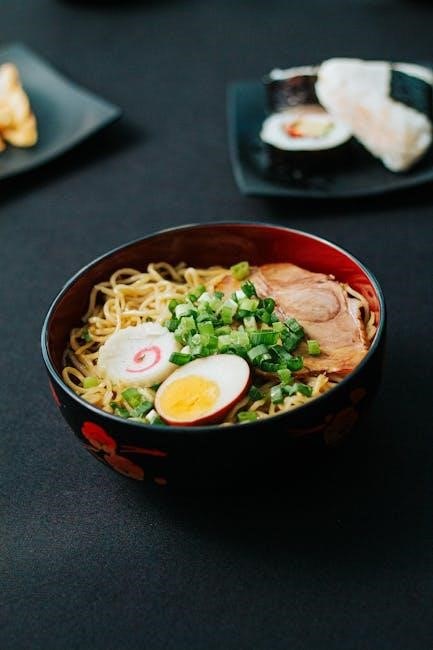Discover intuitive eating with free pdf downloads and guides, learn to respect your body and develop a healthy relationship with food using online resources and books available now on various websites and platforms easily.
Definition and Principles
Intuitive eating is a non-diet, self-care framework that emphasizes respect and dignity for all bodies, it is an evidence-based model with a validated assessment scale and numerous studies to date. The principles of intuitive eating include rejecting diet mentality, honoring hunger and fullness cues, and finding satisfaction in eating. It is about developing a healthy relationship with food and your body, and letting go of guilt and shame associated with eating. The definition of intuitive eating is closely tied to its principles, which prioritize self-care and self-compassion. By understanding the definition and principles of intuitive eating, individuals can begin to develop a more positive and respectful relationship with food and their bodies. This approach to eating is not about following a specific diet or meal plan, but rather about listening to and honoring your body’s needs and desires. Intuitive eating is a weight-neutral approach that focuses on overall health and well-being, rather than weight loss or gain. With intuitive eating, individuals can learn to trust their bodies and develop a more positive body image.
History and Development
The concept of intuitive eating was first introduced in 1995 by Evelyn Tribole and Elyse Resch, two prominent nutritionists who wrote the book “Intuitive Eating”. Since then, the approach has gained popularity and has been widely adopted by healthcare professionals and individuals seeking a healthier relationship with food. The book has been revised and updated several times, with the latest edition being published in 2020. The development of intuitive eating has been influenced by various factors, including the growing awareness of the negative effects of dieting and the importance of self-care and self-compassion. Over the years, intuitive eating has evolved to become a widely recognized and respected approach to eating, with a strong online presence and a community of supporters and practitioners. The history and development of intuitive eating are closely tied to the work of its founders, who continue to play a key role in promoting and advancing the approach. Today, intuitive eating is recognized as a valuable resource for individuals seeking to improve their relationship with food and their bodies.

Benefits of Intuitive Eating
Intuitive eating offers numerous benefits, including improved mental health and weight-neutral approach, available in pdf guides and online resources for a healthier relationship with food and body.
Improved Mental Health
Intuitive eating has been shown to have a positive impact on mental health, with many individuals experiencing reduced stress and anxiety around food and eating. By adopting an intuitive eating approach, individuals can develop a healthier relationship with food and their body, leading to improved overall mental wellbeing. This approach focuses on listening to internal hunger and fullness cues, rather than following external diet rules or restrictions. Online resources and pdf guides are available to support individuals in developing intuitive eating habits and improving their mental health. With intuitive eating, individuals can learn to trust their body and develop a more positive body image, leading to improved self-esteem and confidence; By prioritizing self-care and self-compassion, individuals can cultivate a more positive and supportive relationship with food and their body, leading to improved mental health outcomes. Intuitive eating offers a unique and holistic approach to improving mental health.
Weight-Neutral Approach
Intuitive eating takes a weight-neutral approach, focusing on promoting healthy relationships with food and body, rather than striving for a specific weight or body shape. This approach recognizes that individuals come in diverse shapes and sizes, and that health is not solely determined by weight. By letting go of weight-related goals, individuals can focus on developing a positive body image and cultivating self-care habits. Online resources, including pdf guides and ebooks, provide support and guidance for adopting a weight-neutral approach to intuitive eating; This approach is backed by research, with studies showing that weight-neutral interventions can lead to improved mental and physical health outcomes. A weight-neutral approach to intuitive eating encourages individuals to prioritize health and wellbeing, rather than weight loss or gain. By shifting the focus away from weight, individuals can develop a more positive and compassionate relationship with their body, leading to improved overall health and wellbeing. Intuitive eating resources are available to support this approach.

Resources for Intuitive Eating
Find intuitive eating pdf guides, ebooks, and online courses providing support and guidance for developing healthy relationships with food and body, available on various websites and platforms now easily.
Books and Guides
There are numerous books and guides available on intuitive eating, including the popular book “Intuitive Eating” by Evelyn Tribole and Elyse Resch, which provides a comprehensive guide to developing a healthy relationship with food and body.
The book is available in various formats, including paperback, ebook, and audiobook, and can be found on online platforms such as Amazon and Google Books.
In addition to this book, there are many other resources available, including workbooks, journals, and online courses, that provide guidance and support for individuals looking to adopt an intuitive eating approach.
These resources can be found on websites such as the official Intuitive Eating website, as well as on online marketplaces and bookstores.
Many of these books and guides are also available in pdf format, making it easy to access and download them from the internet.
Overall, there are many books and guides available to support individuals on their intuitive eating journey, and can be a valuable resource for those looking to develop a healthier relationship with food and their body.
The internet has made it easy to find and access these resources, and many are available for free or at a low cost.
Online Resources

There are many online resources available for individuals looking to learn more about intuitive eating, including websites, blogs, and social media platforms.
These resources provide a wealth of information, including articles, videos, and podcasts, that can help individuals understand the principles of intuitive eating and how to apply them in their daily lives.
Many websites offer free downloads, including pdf guides and worksheets, that can be used to support an intuitive eating journey.
Online communities, such as forums and support groups, can also provide a safe and supportive space for individuals to connect with others who are also practicing intuitive eating.
Additionally, many registered dietitians and healthcare professionals offer online coaching and consulting services, which can provide personalized guidance and support for individuals looking to adopt an intuitive eating approach.
Overall, the internet has made it easy to access a wide range of online resources that can support individuals in their intuitive eating journey, and can be a valuable tool for those looking to develop a healthier relationship with food and their body.
These online resources can be accessed from anywhere, at any time, making it easy to fit into a busy lifestyle.
Intuitive eating pdf resources provide valuable information and guidance for a healthier relationship with food and body, promoting overall well-being and self-care easily online now always.

Importance of Intuitive Eating
The importance of intuitive eating cannot be overstated, as it allows individuals to develop a healthier relationship with food and their body. By using intuitive eating pdf resources, people can learn to listen to their internal hunger and fullness cues, rather than relying on external diet rules and restrictions. This approach has been shown to promote overall well-being and self-care, and can be especially beneficial for those who have struggled with disordered eating or body image issues. With intuitive eating, individuals can learn to trust their bodies and make peace with food, rather than constantly fighting against their natural instincts. The internet provides a wealth of information and guidance on intuitive eating, including pdf downloads and online resources, making it easier for people to get started on this journey. By embracing intuitive eating, individuals can cultivate a more positive and compassionate relationship with themselves and their bodies.
